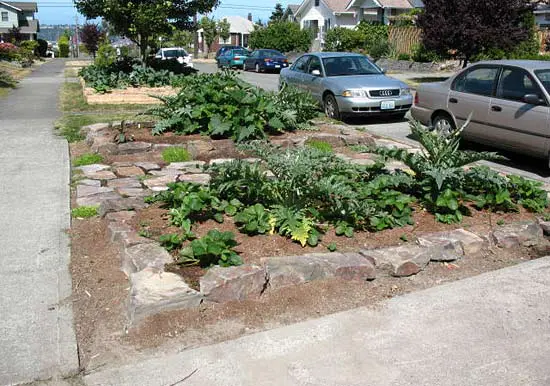From lawns to gardens – removing grass areas to make room for more veggies

If you haven’t read it yet, Mark Bittman of the New York Times has an insightful piece on the benefits of turning lawns into productive gardens. He highlights a case in Orlando where a couple faced a $500-a-day fine for planting vegetables in their front yard. A neighbor had complained it looked “like a farm,” and the city cited the homeowners for a code violation. In response, the homeowner gathered petition signatures outside a polling place and told a local news station, “You’ll take my house before you take my vegetable garden.”
According to Bittman, the city’s latest proposal would limit front-yard gardens to just 25% of the lawn area.
Fortunately, Seattle has long encouraged urban gardening. The city has expanded the number of P-Patches available to residents and relaxed outdated rules about planting in the public right-of-way. Previously, homeowners were required to obtain a $225 permit to grow vegetables or flowers in the “parking strip”—the city-owned space between the sidewalk and the street. After community pushback, the city revised the rules in 2009, allowing residents to plant fruits and vegetables in parking strips, with a few exceptions. For example, the city discourages planting fruiting cherry, apple, or pear trees due to safety concerns from fallen fruit.
Of course, not everyone will want to tear up their front lawns. Vegetable gardens can be time-consuming and may not look great during the winter. (A winter cover crop is recommended to prevent soil runoff.) That said, lawns can still serve a purpose—especially for kids and pets—when maintained responsibly.
At Ecoyards, we promote sustainable lawn care by leaving grass clippings on the lawn, using organic fertilizers sparingly, avoiding pesticides and weed-and-feed products, planting grass species suited for the Northwest, and conserving water.
We’d love to hear from gardeners growing food in Seattle’s parking strips. What are you planting this season? What works well in winter?
Contact Ecoyards if you’re considering converting your lawn into an edible garden—we’re here to help you make the most of your space.
